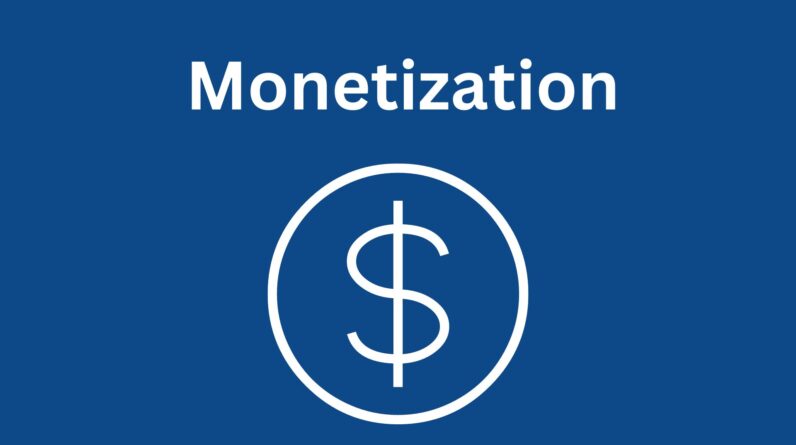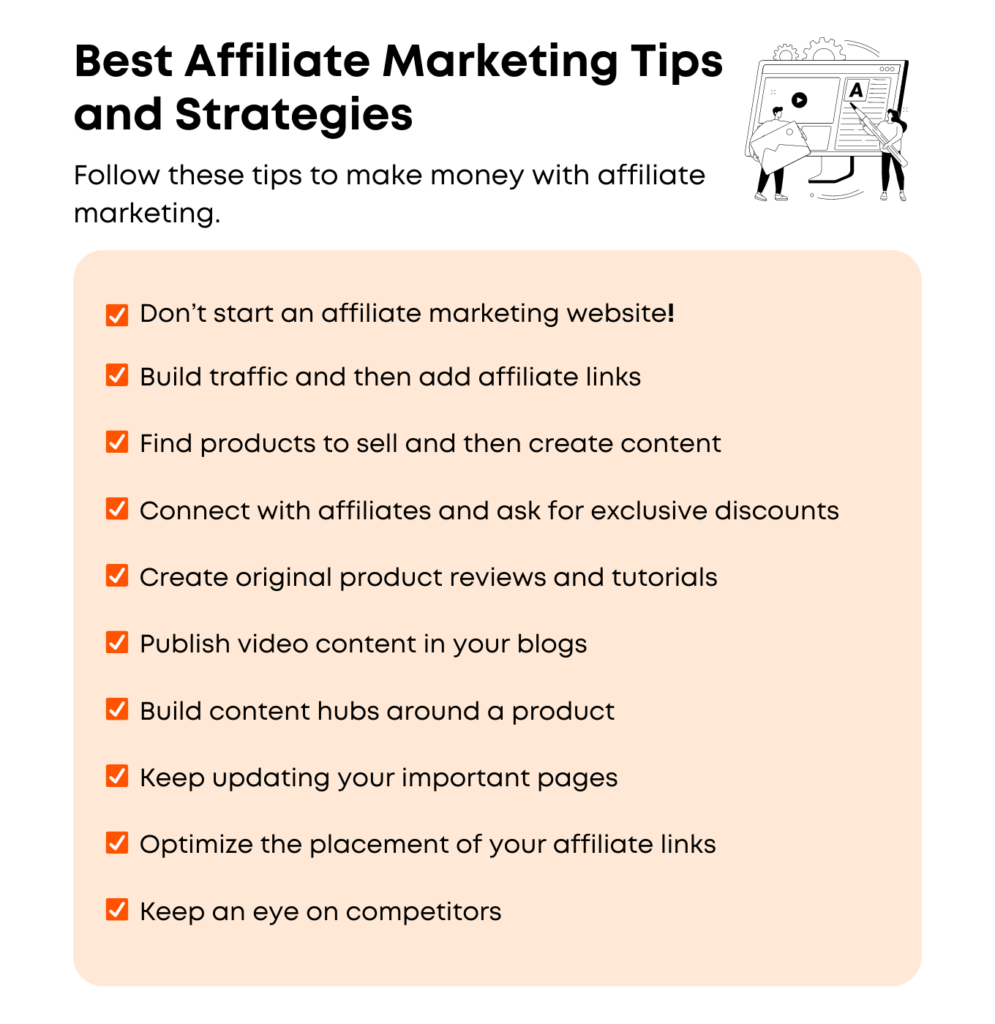
Are you looking for ways to monetize your online presence? Look no further than affiliate marketing! In this article, we will explore ten effective strategies to help you make money through affiliate marketing. Whether you have a blog, a YouTube channel, or a strong social media following, these strategies will help you leverage your audience and earn passive income. From choosing the right affiliate programs to optimizing your content, we’ve got you covered. Keep reading to discover the key strategies for successful monetization with affiliate marketing.
What Are Some Effective Strategies for Monetizing Affiliate Marketing?
When it comes to monetizing affiliate marketing, there are several effective affiliate marketing tips to consider. First, focus on building a targeted audience to maximize your reach. Second, choose quality products or services that align with your audience’s interests. Third, integrate affiliate links within your content naturally and authentically. Fourth, leverage social media platforms to promote your affiliate links. Lastly, track your results and make adjustments accordingly to optimize your earnings.
Monetizing with Affiliate Marketing
Welcome to the world of affiliate marketing! This comprehensive article will guide you through the process of monetizing your website or blog using affiliate marketing. With the right strategies and approach, you can generate passive income by promoting products and earning a commission for every sale made through your unique affiliate links.

1. Choose the Right Niche
The first step in monetizing with affiliate marketing is to choose the right niche. Consider your interests and passions, as it will be easier to create valuable and engaging content when you are genuinely interested in the topic. Research profitable niches by evaluating their demand and competition. Look for a niche that has a sufficient audience but is not overly saturated with competitors. Finding the right niche will set the foundation for a successful affiliate marketing journey.
2. Select Reliable Affiliate Programs
Once you have determined your niche, it’s time to select reliable affiliate programs. Choose reputable affiliate networks that have a track record of providing quality products and services. Look for programs that offer high commission rates, as this will directly impact your earnings. Additionally, ensure that the affiliate programs provide reliable tracking and reporting systems, allowing you to accurately monitor your performance and earnings.
3. Build a High-Quality Website or Blog
A high-quality website or blog is crucial for success in affiliate marketing. Choose a user-friendly platform and domain that aligns with your niche. Optimize your website for search engines by implementing proper SEO techniques. This will improve your visibility and increase organic traffic to your site. Lastly, create valuable and engaging content that is tailored to your target audience. Providing valuable content will not only attract readers but also establish your credibility and authority in the niche.
4. Incorporate Affiliate Links Strategically
Incorporating affiliate links strategically is key to a successful affiliate marketing strategy. Blend affiliate links naturally into your content by integrating them within relevant articles and blog posts. This will ensure that the links flow naturally and do not appear as intrusive advertisements. Additionally, utilize different advertising tools such as banners, widgets, and pop-ups to further promote the affiliate products. Experiment with different placement options to find the most effective strategy for your audience.

5. Leverage Social Media
In today’s digital age, social media plays a significant role in affiliate marketing. Build a strong social media presence by creating accounts on platforms that align with your niche and target audience. Share relevant content and affiliate links on your social media profiles to reach a wider audience. Engage with your followers by responding to comments, asking questions, and providing value through informative posts. Using social media as a promotional tool will expand your reach and drive more traffic to your affiliate links.
6. Utilize Email Marketing
Email marketing is a powerful tool for affiliate marketers to connect with their audience directly. Build a targeted email list by offering valuable content and incentives in exchange for email subscriptions. Send regular newsletters that provide helpful and informative content to your subscribers. Within these newsletters, include affiliate links and promotions to generate revenue. However, it’s important to strike a balance between providing valuable content and promoting affiliate products, as overly promotional emails may lead to unsubscribes.

7. Create Product Reviews and Recommendations
Product reviews and recommendations are an effective way to promote affiliate products. Write honest and detailed reviews of products and services within your niche. Explain the features and benefits, highlighting how they can solve the problems or meet the needs of your audience. Recommend the products and services to your readers, emphasizing why you believe they are valuable. Within these reviews and recommendations, include your unique affiliate links. By providing informative and unbiased content, you will establish trust with your audience and increase the likelihood of conversions.
8. Offer Exclusive Deals and Coupons
Partnering with affiliate programs to offer special discounts and coupons is an excellent way to entice your audience and boost conversions. Negotiate with your affiliate partners to provide exclusive deals and discounts that are not available elsewhere. Promote these exclusive offers on your website, blog, and social media channels. Track and measure coupon usage to gauge the success of your promotional efforts. Exclusive deals and coupons provide added value to your audience and create a sense of urgency, encouraging them to make a purchase.

9. Host Giveaways and Contests
Hosting giveaways and contests is a fun and engaging way to interact with your audience while promoting affiliate products. Collaborate with your affiliate partners to offer attractive prizes that align with your niche. Create interactive contests that require participants to engage with your affiliate links to enter. For example, you can ask participants to sign up for your newsletter or follow your social media profiles. This strategy not only boosts engagement but also increases the visibility of your affiliate links, potentially leading to more conversions.
10. Continuously Monitor and Optimize
The final strategy for monetizing with affiliate marketing is to continuously monitor and optimize your efforts. Analyze your affiliate performance regularly to identify patterns and trends. Experiment with different strategies and approaches to determine what works best for your audience. Track conversions and measure the effectiveness of your campaigns, allowing you to optimize and improve your results over time. Affiliate marketing is an ongoing process, so stay proactive and adapt to changes in the industry to maximize your earnings.
In conclusion, monetizing with affiliate marketing requires careful planning and execution. Choose a niche that aligns with your interests and has the potential for profitability. Select reliable affiliate programs with high commission rates and reliable tracking systems. Build a high-quality website or blog and optimize it for search engines. Strategically incorporate affiliate links into your content and leverage social media and email marketing to reach a broader audience. Create honest product reviews and recommendations, and offer exclusive deals and coupons to entice your audience. Host giveaways and contests to boost engagement, and continuously monitor and optimize your efforts for better results. By following these strategies, you can successfully monetize your website or blog with affiliate marketing and generate passive income. Happy affiliate marketing!








